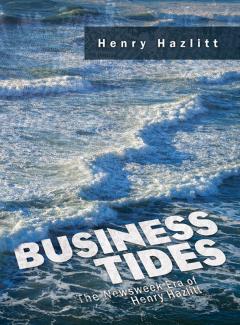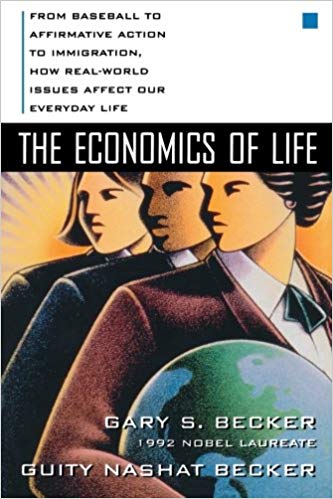A history of American economic policy in six books
There is a surprising lack of good economic commentary these days. Noah Smith at Bloomberg is worth reading, but, otherwise, Paul Krugman, New York Times polemicist, has largely obliterated Paul Krugman, excellent academic economist, much as Darth Vader slew Annakin Skywalker.
It wasn’t always like this. There was a time when leading economists would write for a mass audience, commenting on the issues of the day, and applying economic principles to them. If you can find collections of these articles and read them in order, not only do you get a decent course in economics, but you also get a good education in America’s post-war economic history. These six books are a suggested guide.
 Business Tides by Henry Hazlitt
Business Tides by Henry Hazlitt
Henry Hazlitt was a leading journalist who developed a keen interest in economics. His book Economics In One Lesson, first published in 1946, remains an excellent introduction to the subject for the general reader.
From 1946 to 1966, he commented on the economy for Newsweek in his ‘Business Tides’ column. These have now been collected together and are available in a book called, well, Business Tides. In it, Hazlitt covers the recession which followed World War Two, the recovery in the 1950s, and the boom of the mid-1960s which was already causing him concern by its inflationary nature in 1966.
An Economist’s Protest and Bright Promises, Dismal Performance by Milton Friedman and The Samuelson Sampler and Economics from the Heart by Paul Samuelson
Milton Friedman is one of the great economists. He worked both at the highest level of abstract, academic economics, and was also able to communicate economic ideas to a mass audience. His books Capitalism and Freedom and Free to Choose remain essential reading for anyone trying to understand the relationship between free markets and free people.
The liberal yin to Friedman’s free market yang was Paul Samuelson. Like Friedman, Samuelson worked at both the highest level of academic, economic abstraction, and in communicating his views to a wider audience. If you studied economics at college, the chances are that you used either Samuelson’s textbook Economics, or a more recent version by William Nordhaus (announced a Nobel winner today) which carries it on. 
Between 1966 and 1981, both men wrote columns for Newsweek (Friedman continued until 1984). Many of these can be found in four books, now sadly out of print, but still attainable for a reasonable price. An Economist’s Protest picks up Friedman’s columns from 1966 to 1974 with Bright Promises, Dismal Performance taking them up to 1982. For Samuelson, The Samuelson Sampler and Economics from the Heart respectively cover the same periods. The two men, good friends in real life, offer differing perspectives on a period which covered the end of the post-war Golden Age, Stagflation, and the rise of Reaganomics. The economics of Friedman eclipses that of Samuelson.
 The Economics of Life by Gary Becker
The Economics of Life by Gary Becker
Like Samuelson and Friedman, Gary Becker was a Nobel prize winner in economics. Again, he was a first rate academic economist who applied economic principles to a variety of fields, from the family to crime to education.
From 1985 to 2004, he wrote a monthly column for Business Week. The first eleven years worth are collected in The Economics of Life. This was a period when, following the experiences of the 1970s, macroeconomic intervention was frowned upon and a consensus of sorts had formed around free markets. Reflecting this, Becker’s columns focus more on microeconomic issues such as crime and discrimination. Here you get accessible distillations of the often math heavy academic work which won him his Nobel prize and made him one of the most influential economists of the last three decades. Every Freakonomist is following in Becker’s footsteps.
These six books offer a course in both economics and the economic aspects of post-war U.S. history. They also offer a window on a time when debate about these issues was, perhaps, less shrill than it is now. It was also, probably, more fruitful.
John Phelan is an economist at the Center of the American Experiment.